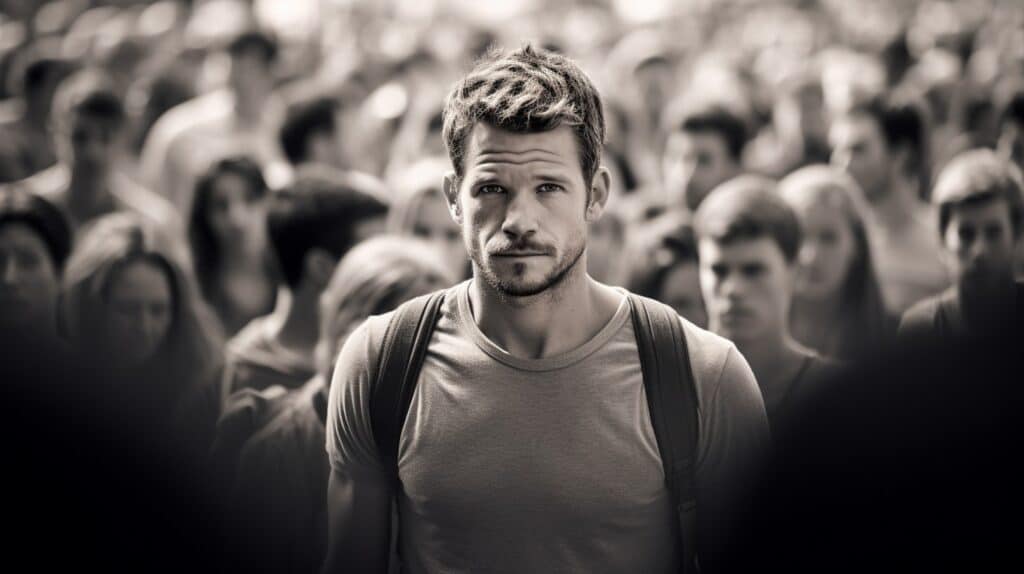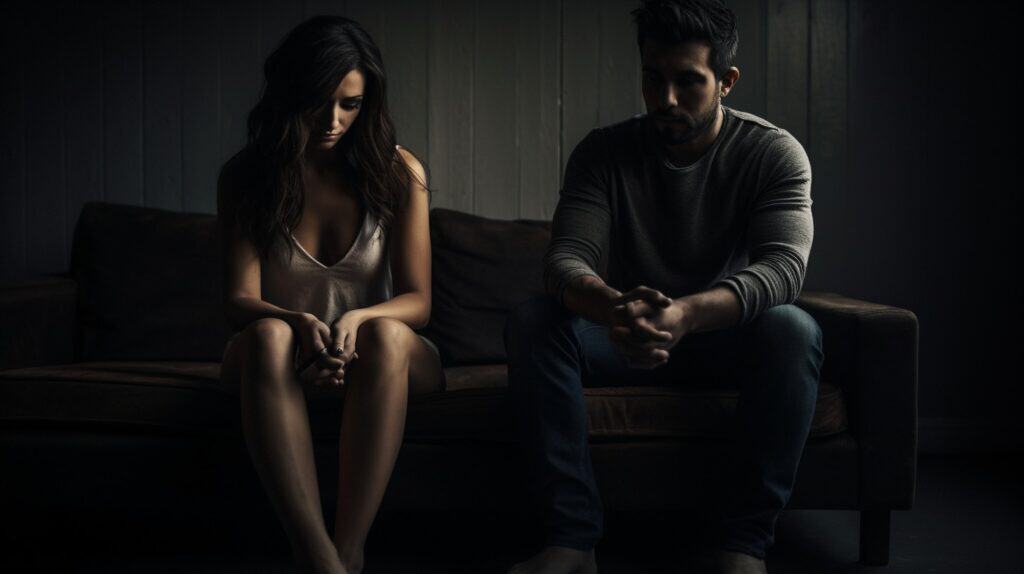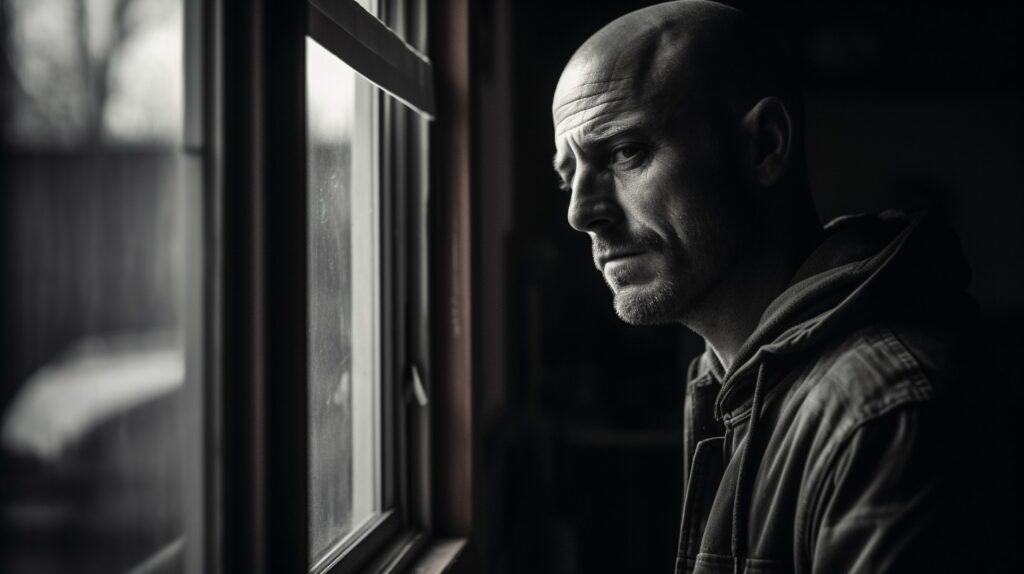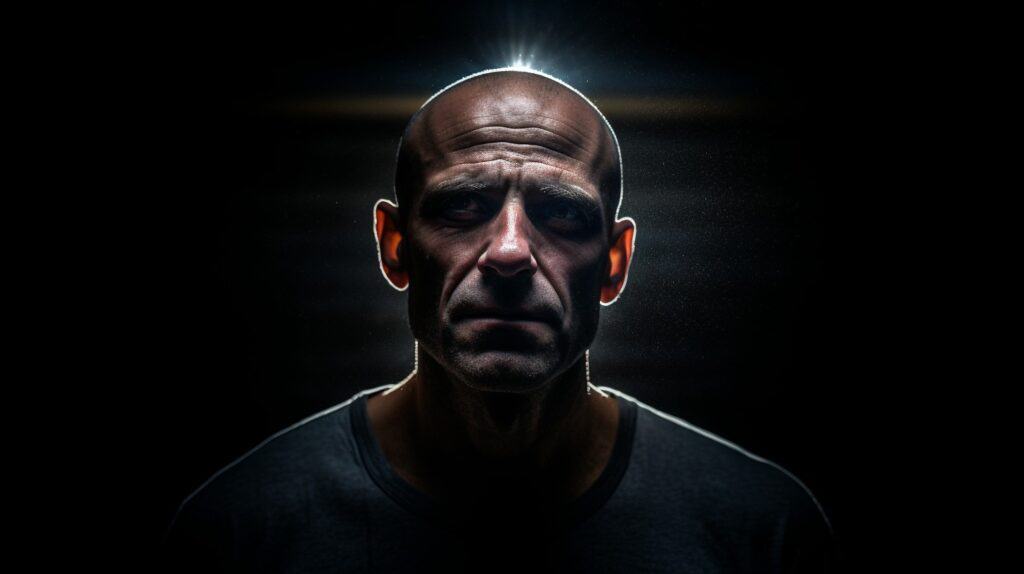Countless men find themselves navigating through the shadows, silently grappling with relationships that take a toll—be it physical bruises or deep emotional scars. Witnessing their battle up close and immersing myself in research, I understand how vital it is to shine a light on these often unseen struggles.
This article aims to unpack the complexities of why men remain in abusive situations with women and provide actionable steps towards healing and true liberation. If this speaks to you, keep reading; because stepping out of this cycle could be your next courageous move toward a healthier life.
Key Takeaways
Men sometimes stay in abusive relationships due to fear, shame, and stigma. They worry about not being believed or being seen as the aggressor.
Psychological factors like trauma bonding and manipulation can make it hard for men to leave their partners. Economic dependency and worries about children also play a role.
Guys facing abuse can be isolated emotionally and might have trouble admitting what’s happening.
Talking openly about the abuse is a critical first step towards healing. Seeking counseling and making a safety plan are important steps too.
There are people who understand what male victims of abuse go through and support is available. Reaching out for help shows strength, not weakness.
Table of Contents
The Stigma of Male Abuse: Societal Perceptions and Realities

Men grappling with abuse often confront a profound stigma that shadows their experiences, challenging the validity of their suffering in the eyes of society. This cultural dismissal not only silences their voices but also deeply impacts their journey toward healing and empowerment.
Stigma and shame
I know it’s hard to talk about being hurt by someone you love. It feels like people will laugh or say you’re not “manly.” But I’m here to tell you, it’s not your fault. Did you know that 1 in 7 guys have been through what you’re going through? You are not alone.
Shame can be heavy. You might think friends and family won’t understand if your wife or girlfriend is cruel to you. Many of us were told to “man up” as kids. Now, asking for help seems like giving up.
But reaching out shows strength, not weakness. It takes guts to admit something is wrong and look for a way out.
Fear of not being believed
The weight of stigma and shame can be heavy, but there’s something else that might hold me back even more: the fear that no one will believe what I’m going through. It’s tough enough to face an abusive situation without worrying that friends, family, or even police will doubt my story.
As a man, society often tells me I should be strong and in control. This makes it hard to admit if my partner hurts or scares me. People might laugh it off or say I’m making it up because they can’t imagine a woman being violent toward a man.
It gets even harder when the abuse messes with my head—like with gaslighting—so much that I start questioning what’s real myself. The thought of reaching out for help just to get turned away is terrifying; would anyone take my word over hers? That’s why many guys like me keep silent and try to handle things on our own, which only leaves us stuck in these harmful relationships longer.
Concerns about being perceived as the aggressor
I get why some of us guys hesitate to talk about being hurt by our partners. There’s this big worry that people will flip the script and think we’re the ones causing trouble. It’s not easy with all those stories out there saying men are usually the tough ones.
Nobody wants to come forward just to be accused of being an abuser themselves. Facts show many male victims stay quiet because they fear exactly this—getting labeled as violent when they’re really on the receiving end.
Sometimes I feel trapped, like I can’t speak up or defend myself without making things worse. It messes with your head, knowing you could be seen as aggressive just for telling your side of things.
But understanding how abuse works can make a huge difference in finding a way out. Let’s look at what keeps us stuck in these toxic cycles next.
The Psychology Behind Staying in Abusive Relationships

The human mind is complex, often entwining us in patterns we can’t easily escape; this holds true when men find themselves grappling with the invisible chains of an abusive relationship.
It’s not just about fear or love—psychological factors like trauma bonds and manipulation play a critical role in why some men feel unable to leave even the most toxic partners.
Trauma bonding and the abuse cycle
Trauma bonds make it tough to walk away from someone who hurts you. It’s like a strong link that forms between us and our abusers. This bond grows every time they switch from being mean to nice, making us hope things will get better.
We might feel stuck because leaving feels like we’re giving up on them, and we’ve been taught that “man up” means not quitting.
The cycle of abuse is sneaky; it goes around and around, keeping us trapped. First comes the sweetness—the honeymoon phase—where everything seems okay again. Then tension builds until there’s an explosion of anger or hurtful words or worse, and after that back to kindness.
Each cycle can break down how we see ourselves, chipping away at self-worth until it’s hard even to think about leaving.
Low self-esteem and self-worth
Being stuck in an abuse cycle often chips away at your confidence and self-respect. You might start to feel like you’re not worth much. This feeling can come from the bad things that happen over and over again with someone who is supposed to love you.
She might hurt you, say mean words, or make you feel small. These actions can make believing in yourself really hard.
I know it’s tough because everything may seem dark and hopeless. But trust me, these feelings don’t tell the truth about who you are or define your value as a person. The guilt of leaving can be heavy too; however, it’s important to see this for what it is—a side effect of being treated poorly by someone else, which isn’t your fault at all.
Psychological manipulation by the abuser
Sometimes, an abuser will play mind games. They might say things to make you feel confused or crazy. This is called psychological manipulation. It’s like being trapped in a maze where every turn can be a trick or a trap set by the one who’s supposed to love you.
You might start to doubt yourself and believe the mean words they say.
Abusers often twist your feelings so that you stick around, thinking it’s your fault or that you need to fix things. They use love as bait but then hurt you on purpose just to keep control.
When someone keeps messing with your head, it makes getting away from them really tough. Now, let’s look at what happens outside of our minds that also makes men stay put.
External Factors Influencing Men to Stay

Understanding the external pressures that can trap men in abusive relationships opens our eyes to complex dynamics often hidden by societal norms, inviting us to delve deeper into how factors such as economic dependency and cultural expectations cement their silence.
Financial dependency and lack of autonomy
Money troubles can trap a guy with an abusive partner. If she controls the cash, it’s tough to leave. Picture this: I’m stuck in a job that pays just enough to get by, and all my money goes straight into our shared account.
My wife holds the purse strings, and without her say-so, I can’t even buy a coffee without feeling guilty. Breaking free seems impossible when you’re penny-pinching, and every dime is watched.
Sometimes, guys stick around because they think they have no choice. They feel like they can’t make decisions on their own anymore. It’s like being in a car where someone else is driving—you’re just going along for the ride whether you like it or not.
And if there are kids? That’s another layer of worry about keeping food on the table and a roof over their heads if I decide to pack up and go. It takes courage and careful planning to step out of that shadow and start calling the shots in your life again.
The desire to maintain family stability for children
Money isn’t the only thing that can make a man feel stuck in an abusive relationship. Even more powerful is the wish to keep their kids’ lives stable. Many fathers are scared they might lose their children if they leave.
They worry about a judge giving custody to the wife or breaking up the family home. This fear keeps them from walking away.
Guys often hear that it’s their job to be strong for their families. They think that staying, no matter how bad things get, is better than leaving and making big changes for their kids.
But this choice comes with a heavy cost. Staying might mean more harm and sadness for everyone, including those same children we want to protect.
Societal expectations and misapplication of cultural norms
Keeping a family together is a strong force, but often, there’s more pushing men to stay in unhealthy situations. Around us, society has its own idea of what makes a man. From when we’re little boys, the message is clear: be tough and control your emotions.
It tells us that to leave an abusive relationship means giving up or failing as a man.
These wrong ideas about being “manly” make it hard for guys like us to step away from bad relationships. We might worry about what friends will say or how it looks if we can’t “handle” our situation at home.
But sticking around just because people expect you to isn’t brave—it’s risky. It’s important I figure out what’s really best for me without letting these messed-up norms decide my actions.
The Challenges Men Face in Abusive Relationships

Men enduring abuse within relationships often confront a silent battle, weighed down by the concealed scars of emotional and physical trauma. These survivors face unique obstacles that can impede their journey toward healing, including societal expectations that cloud recognition of their pain and hinder them from seeking the vital help they need.
Emotional isolation and disconnection
Feeling alone is tough. It’s even harder when you’re with someone who hurts you. As guys, we might feel cut off from friends or family because of a crazy wife or an emotionally abusive partner.
We may think no one will understand or, worse, that they’ll judge us. This loneliness isn’t just in our heads either; it comes from a real place where the shame and stigma about male abuse keeps us silent.
I know how it feels to be trapped by these invisible walls. Sometimes society says men should be tough and handle their own problems, so we keep quiet and suffer in silence instead of reaching out for help.
It takes courage to break through that emotional isolation, but remember: there are folks ready to listen and support us—people who get what we’re going through because they’ve been there too.
The impact of physical, emotional, and sexual abuse
Being hurt by someone you care about is tough. Physical abuse can leave marks on your body and make you afraid. Emotional and sexual abuse can mess with your mind, making you feel small or like everything is your fault.
It’s not right for anyone to hit you, shout at you, force you into sex, or play mind games. These bad things make it hard to feel good about yourself.
It’s okay to admit if this is happening to you. You’re strong even when dealing with this kind of pain. Abuse can make life seem dark, but I want you to know there’s hope and ways to get back in control of your story.
Difficulties in acknowledging and naming the abuse
I know it’s hard to admit you’re in an abusive relationship. It feels like a big weight that men are not supposed to carry. But remember, 1 in 7 of us face intimate partner violence, and it can be tough to say out loud.
You might worry people won’t believe you, or they’ll think less of you as a man. This is because society often tells us guys have to be strong and handle everything on their own.
Sometimes the hardest part is just seeing the truth for what it is. Your partner might hurt your feelings, control who you talk to, or even hit you. It doesn’t seem right because she says she loves you or maybe blames you for her actions.
These signs – being cheated on, verbally assaulted, feeling shamed – these are real red flags of domestic abuse.
Now let’s talk about finding strength and hope in this challenging time.
Pathways to Empowerment and Recovery

Unlocking the chains of an abusive relationship is no easy feat, especially for men who’ve felt shackled by silence and stigma. Yet, there’s hope on the horizon; I’ll guide you through how we can step into our power and rebuild a life marked by respect, safety, and well-being.
Recognizing and naming the abuse
I know it’s tough, but naming the abuse is a bold first step. It means calling out the actions that hurt, even if they don’t leave marks. If she yells, threatens, or makes you feel small – that’s verbal assault.
When she hits or forces you into sex without consent – that’s physical and sexual violence. And if mind games are her thing, twisting your words and making you doubt yourself – let’s call it what it is: emotional abuse.
And I get it; speaking up takes courage when fear and shame are in the mix. But remember this: 8.3% of guys like us report emotional abuse in our relationships. That tells me we’re not alone in this fight to claim our worth back from abusive partners who try to break us down with maltreatment or weird control moves like silent treatment.
Seeking professional counseling and support
Once you see the abuse for what it is, finding help is your next step. You might feel lost or scared about this part. That’s okay. Talking to a counselor can really help you heal and grow stronger.
They know how to listen and guide people who have been hurt by someone they love.
A good therapist will understand your struggles as a man in an abusive relationship. They won’t judge you or make you feel less “manly.” Instead, they’ll give you tools and ideas on how to deal with what’s happening and make a plan for safety that works for you.
Reaching out isn’t showing weakness; it’s taking control back into your hands. It takes courage to admit you need support, but doing so can start changing your life for the better.
Building a safety plan and support network
Moving from seeking help to making a plan, creating a safety plan is smart. This plan should have steps you can follow if things get too tough or dangerous with your partner. It helps you stay safe and leave fast if needed.
Start by figuring out who in your life you can trust—friends, family, or coworkers. Let them know what’s going on. They can be part of your support network.
You also need to think about where you could go quickly if you had to leave home suddenly. Keep important stuff like money, documents, and extra clothes in a place that’s easy to reach.
Remember phone numbers for people who care about you and places that offer help for men in bad situations like these. Having this kind of support around gives you more strength to deal with tough times and make changes when it’s time.
Changing the Narrative for Male Abuse Survivors
I know it’s tough for men to talk about being hurt by someone they love. But remember, you’re not alone, and it’s okay to ask for help. Your strength is in speaking up and taking steps towards a safer life.
Let’s change the story together, so all survivors of abuse find the support they need. It starts with you and your courage to move forward.
FAQs About Why Men Stay with Abusive Women
Why do some men stay in relationships with abusive women?
Some men stay because they have strong emotional attachments, maybe feeling gratitude or love, even if the woman is abusive.
What are signs that a woman might be abusive to her man?
Signs she’s crazy or aggressive include being physically violent, cheating on you, and showing other behaviors that seem weird or psycho.
Can violence against men be just as serious as violence against women?
Yes, domestic battery and marital violence can also happen to men and it’s just as serious when a man is hurt by an abusive wife.
What should a man do if he wants to leave a crazy wife but feels stuck?
He should look for help from friends or professionals like a Christian counselor who understands situations like these.
Is ‘made to penetrate’ a form of domestic violence?
It sure is; ‘made to penetrate’ means forcing someone into sexual acts, which is another type of abuse in relationships.
How can society help reduce cases of men staying with abusive women?
We need more positive reinforcement and goal-setting for healthy relationships while empathizing with those who feel vulnerable due to domestic violence.


